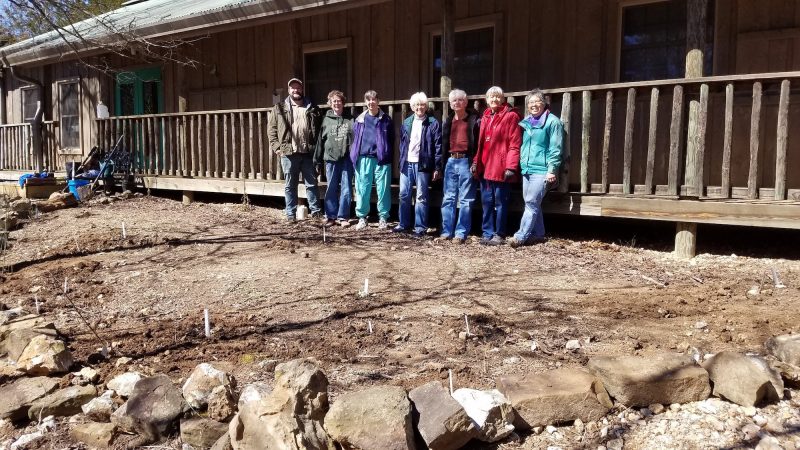Cultivating the Next Generation of Naturalists

Fayetteville Arkansas Quakers Create Native Plant Garden for Ozark Natural Science Center
By Eric Fuselier.
The Fayetteville Monthly Meeting recently planted a native plant garden at the Ozark Natural Science Center (ONSC) located south of Eureka Springs, Arkansas. This native plant garden was a gift to ONSC, which is a non-profit residential field science education center that has been providing environmental education for schools and other groups since 1992.
ONSC’s stated mission is “to enhance the understanding, appreciation, and stewardship of the Ozark natural environment.” Each spring and fall, approximately 3,000 5th graders visit ONSC from schools all across the northwest Arkansas region and beyond in order to participate in an overnight nature immersion and environmental education program. While at ONSC, students learn about the importance of water quality and the environmental impacts of food waste, and are led on several guided hikes in the adjoining Bear Hollow Natural Area where they receive hands on experiential learning opportunities about the ecology of the Ozark ecoregion.
The new native plant garden provided by the Fayetteville Quakers is intended to serve as an educational tool where the students and other visitors at ONSC can learn about the various species of flora found in the Ozark ecoregion and how they fit into the local ecosystem.
The species that were selected for placement in the garden are common in the Ozark ecoregion, and an emphasis was placed on selecting species that will attract pollinators such as birds, butterflies, and other pollinating insects. These species include American beautyberry (Callicarpa americana), northern spicebush (Lindera benzoin), wild hydrangea (Hydrangea arborescens), purple coneflower (Echinacea purpurea), common milkweed (Asclepias syriaca), butterfly milkweed (Asclepias tuberosa), foxglove beardtongue (Penstemon digitalis), golden Alexander (Zizia aurea), bloodroot (Sanguinaria canadensis), and downy phlox (Phlox pilosa).
These pollinator-friendly species will provide educational opportunities beyond the importance native plants. They will expand the educational value of the garden to include lessons in ornithology, entomology, and ecology as students observe the pollinators visiting the blooming wildflowers, and the caterpillars consuming and laying their eggs on the milkweeds.
Many of the native plants that were placed in the garden were donated from the Northwest Arkansas Master Naturalists’ native plant nursery, while others were purchased from local native plant nurseries with funds provided by the QEW Minigrants program and other sponsors.
In addition, both the common name and scientific name for each species were painted on the smooth surfaces of large cobblestones. These stones were placed in a visible location in front each grouping of species in order to assist the students and other visitors in identifying the plant species they are seeing.
